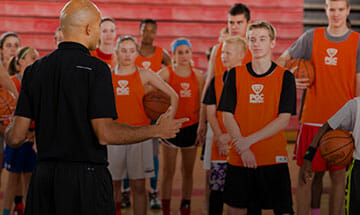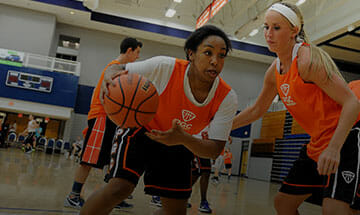Fall Head over Heels in Love with Miss Takes
Fall in love—I’m talking about falling HEAD OVER HEELS in love—and
you’ll be a better basketball player.
As a young high-school athlete I’d never experienced falling in love, not until I started training with professional athletes in Houston. (Yes, just as the commercial says, the NBA CARES, they really do.) That was where I got to know Miss Takes. Oh, I didn’t love her immediately—I even cursed at her at the beginning of our relationship—I wanted her to go away, but somehow, I could never get rid of her. I began to appreciate her and eventually, I grew to love my Miss Takes.
Professional athletes love to make mistakes during their training. They push themselves until mistakes occur because athletes at the highest level know that mistakes—during maximum effort—are the path to improvement. In fact, mistakes are tiny signs of improvement.
Athletes, get this formula into your basketball brain:
(Mistakes X Correct Form) / Maximum Effort + Charting Results = Improvement
If you compare most high school athletes to professional athletes, the difference in how mistakes are viewed is glaring. Steve Nash has said, “I’m uncomfortable being comfortable”, and what the two-time MVP means by that is: if he is training at a level of comfort – if he is not pushing himself to the level of mistakes – then he is actually uncomfortable because he knows he’s NOT IMPROVING.
At PGC, we pride ourselves on creating an environment focused on the Encouragement of Learning and Development, not on Evaluation. Even after stating this in our classroom sessions and reinforcing it on court, athletes still may have the feeling of “I feel like I got worse today.” When I hear that or see it, I ask athletes to elaborate and their answer is generally “I made so many mistakes.”
I can’t blame the athletes for their response because I realized that throughout their entire careers they had been taught that mistakes were bad.
In the U.S. we’re putting young athletes more and more in “evaluative” environments (a.k.a. Games, games, and oh yea, more games). Athletes learn that mistakes equal poor performance and disappointed parents or coaches.
Read More: DON’T WASTE YOUR TIME GETTING SEEN
Athletes who train only in evaluation environments tend to do one of two things:
- They slow down so they don’t make those mistakes that cause their coaches to yell at them
- They start playing tentatively, trying NOT to make mistakes.
If I had 17-cents for every parent who asks how to help their son/daughter “play like they used to” or “play looser or with more confidence” I would be sipping Pina Colados with T.O. himself on some private island beach. (Terrell would probably be doing crunches in the sand, but I’d be relaxing.)
Luckily, Day 2 at a PGC Session tends to garner a different response as the athletes begin to realize the importance of mistakes, on the road to becoming a better player, but it didn’t prevent me from still feeling sorry for all those athletes who aren’t being encouraged to make mistakes at full speed in order to become a better player.
Coaches: Obviously the Championship Game is not where you’d like your athletes to make the most mistakes, but what if we provide them with an environment that encourages mistakes often and early during training and in practice. What if we even rewarded them for making the mistake if they were going full throttle?
Related Articles
5 Ways Any Basketball Player Can Earn More Playing Time
Want more playing time? Stop asking for it and start earning it. These five habits separate players coaches trust from players who stay stuck on the bench.
5 Ways to Practice Mental Toughness
Here are five ways to practice your mental toughness off the court. If you practice these five things, every day, you’ll develop greater self-discipline. You’ll become unstoppable in anything you do. It is five things you will have to rise above your feelings every day. That is how you build mental toughness. You develop, as a habit, a muscle of rising above your feelings to level of your aspirations and commitments.
Why Is My Performance Inconsistent?
Do you ever feel like your performance in games is consistently inconsistent? That you’re putting in the same hard work at practice every day, yet some days you play really well and others you don’t play well at all? If that’s you, you’re not alone. If that’s not you, don’t worry—the frustration is coming soon!
About PGC
PGC Basketball provides intense, no-nonsense basketball training for players and coaches. Our basketball camps are designed to teach players of all positions to play smart basketball, be coaches on the court, and be leaders in practices, games and in everyday life.
We combine our unique PGC culture with a variety of teaching methods and learning environments to maximize the learning potential of those that attend our sessions. In addition to spending 6-7 hours on the court each day, lessons will be reinforced through classroom sessions and video analysis.
Our goal at PGC is to empower you with the tools to fulfill your basketball dreams, while also assisting you in experiencing the joy of the journey.
To learn more about PGC Basketball, including additional basketball training tips and videos, visit our YouTube Channel or find us on Facebook, Instagram, and Twitter.





Share This Post